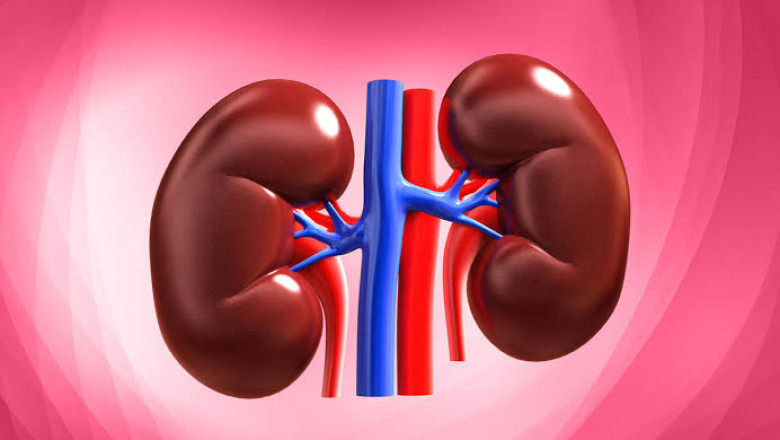views

The kidney is the body organ that is responsible for filtering waste and removing toxins & excess fluid from the bloodstream. These two bean-shaped organs, which are roughly the size of an average human fist, are present in most persons in pairs. However, some people only have one kidney, and fortunately, one functioning kidney may continue to perform its role as long as it still retains up to 10% of its function.
Now, kidney failure—also known as renal failure—is a disease when either one or both kidneys are unable to carry out their normal functions. As a result, waste that should be filtered out accumulates in the body, which might ultimately result in death.
Seizures, edema in the ankles and legs, nausea, vomiting, muscular cramps and twitches, itching, excessive weariness, decreased urine production, lack of appetite, overall weakness, poor focus, and poor appetite, among other symptoms, are frequently associated with kidney failure.
Usually, this condition is deadly. On the other hand, it is also preventable, and as they say, prevention is better than cure, especially in this case since kidney failure cannot be treated.
Let's first discuss some of the frequent causes of renal failure before considering measures to prevent this dangerous ailment.
Causes of Kidney Failure
Acute kidney failure and chronic kidney failure both have different causes.
When a kidney abruptly stops functioning, it experiences acute renal failure, which is typically reversible.
Some of its causes include dehydration, severe blood loss, extremely low blood pressure, acute pyelonephritis of the kidneys, urinary tract blockage, use of heroin or cocaine, and kidney tubule injury. - fast interstitial kidney disease
On the other hand, chronic kidney failure happens when kidney function is lost over time. It cannot be reversed, and with time, it grows worse.
Chronic kidney infections, diabetes, high blood pressure, slow-moving interstitial nephritis, hereditary disorders, and autoimmune illnesses including lupus nephritis are a few of its causes.
Tips for Preventing Kidney Failure
- Reduce your salt consumption.
High blood pressure has been linked to eating too much salt, which is bad for the health of your kidneys.
- Take enough water
Dehydration significantly lowers blood flow to the kidney, potentially causing its damage. So, while minding a business, drink enough water too!
- Avoid smoking
Smoking can decrease blood flow to the kidneys, which can harm their functioning even in the absence of renal disease.
- Avoid Stress
Stress and worry can raise blood pressure, which is linked to chronic kidney failure.
- Manage your blood pressure.
As you now know, having high blood pressure raises your chance of developing heart disease and eventually renal failure.
- Prevent Unhealthy Weight Gain
Being overweight and obese can raise your chance of developing diabetes and high blood pressure, which have both been linked to kidney failure.
- Take Healthy Meals
Your diet should be heavy in fruits, vegetables, whole grains, and fiber and low in sugar to promote heart health. You can avoid gaining too much weight by doing this.
- Maintain a healthy blood sugar level.
Diabetes can raise the chance of developing heart disease, renal failure, and other conditions similar to how high blood pressure does.
- Engage in regular physical activity
Regular physical activity can help you manage high blood pressure, diabetes, and stress while also assisting in maintaining a healthy body weight.
- Limit your alcohol consumption.
Alcohol contains more calories, which can cause excessive weight gain and raise blood pressure. As much as you can, avoid using it excessively.
- Refrain from using over-the-counter painkillers
Ibuprofen, naproxen, and aspirin should not be used in excessive amounts or could be avoided entirely. They can damage your kidneys by decreasing the blood supply to them.
- Do Regular Body Checkups
It is advisable to schedule intermittent appointments with your healthcare provider for checkups to know the state of your health. This way, you would be able to know if something is wrong and be able to curb it on time.
Final Words
Having kidney disease is not an outright death sentence, especially if discovered early and managed appropriately.
In light of this, it is crucial that you visit your doctor as soon as you can if you have any symptoms of kidney disease.
Kidney disease can be stopped from progressing to kidney failure if it is identified and treated early.
While it is possible to both treat and cure acute kidney disease, the only way to manage chronic kidney disease is to stop its progression with the right medical care.
Ultimately, prevention is still considerably more advantageous and less expensive than treatment. As a result, we urge you to put your kidneys' health first and support the preservation of their function by leading a healthy lifestyle while controlling your blood pressure and sugar levels.
We hope you found this helpful!












Comments
0 comment